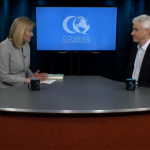By Kathleen Biggins, President and Founder
Because I spend so much time thinking about the climate, many people have reached out to me to ask whether I am “excited” or “happy” that skies are clearer and greenhouse gas emissions are decreasing during our worldwide lockdown. My answer is that it is complicated.
Like all of you, I am horrified by the tragedy that led to those clear skies and emissions reductions – a pandemic that has created economic and personal suffering on an almost unprecedented scale. My first thoughts are for those who have been harmed, and I recognize the priority of righting our economic ship. I also recognize that in the past, emissions reductions due to economic downturns were momentary blips, and did not change our overall long-term emissions trajectory.
It is still early in this pandemic crisis to extrapolate clear lessons. However, here are some reflections on how the pandemic could help us in our fight against climate change:
- The vivid clarity of cleaner air reminds us of the price we pay for reliance on fossil fuels to power our economy – allowing us to “see” the benefits of pivoting to a lower carbon world. Greenhouse gases may be invisible, but the brown cloudy murk of soot and particulate matter is not.
- Our understanding of the link between economic health and our personal health and security is stronger. We are reminded that we cannot have a strong economy if we collectively feel imperiled – whether from this or some future virus, or from increasingly deadly and more frequent heatwaves, wildfires, high-intensity hurricanes or from food and water shortages caused or exacerbated by climate change.
- We have also been reminded of the power of nature – and that our advanced societies, complete with sophisticated infrastructure and technology, can be easily overwhelmed. When we change the natural systems that have been in place while our civilization has evolved and thrived, we can unleash forces we cannot handle. These changes include deforestation and habitat destruction that can expose us to new zoonotic viruses or heating up the world through increased carbon emissions leading to declining food resources.
- Despite the politicization of the issue, the vast majority of U.S. citizens continue to turn to trusted experts – doctors, scientists and respected institutions – to understand the risk and increase safety during this crisis.
- We ignore science at our peril. A wide range of scientists has warned us about an impending pandemic for years, but our leaders did not take the risk as seriously as it deserved. This is a direct analogy to the climate crisis.
- The world has become smaller and more interconnected which means threats like this pandemic and climate change cannot be handled alone. Some risks require collaborative action. This is true both at an individual and national level.
- Some risks also require early action – if we wait, they can become too big for us to control. Countries that acted early and decisively had better outcomes in controlling the virus. As we are doing in the pandemic, we need to “flatten the curve” of our carbon emissions now in order to avoid a runaway and overwhelming catastrophe in the future.
- When we feel threatened, social norms can change quickly. Often people can accept new ways more readily. The COVID-19 crisis has led to unprecedented scientific collaboration, an acceptance of telecommuting, and staggered work schedules. After 9/11 we accepted the need for enhanced security, increasing our time and stress for airline travel. Once we learned of the dangers of second-hand smoke, smokers were banned from common areas. These examples of rapid change give me hope that when people recognize the danger climate change presents to them personally, society will act quickly.
- Renewable energy is important for energy independence and economic security. Renewables have been more resilient than other fuels during the pandemic crisis in part because they do not depend on a supply chain for fuel and because they have become so inexpensive. They are already the cheapest way to generate new power in two-thirds of the world and are expected to be the least expensive everywhere by 2030. And that’s on an apples-to-apples unsubsidized basis. In fact, more than 70% of all new power capacity last year worldwide was from renewables. Their share of our energy mix has increased during the pandemic, partly due to reduced demand favoring lower cost fuel, proving we can integrate higher levels of clean energy without compromising the stability of the grid.
According to an analysis from the Financial Times (FT), we will not be able to use all of our current fossil fuel assets if we are to meet the most recent international climate goals. The FT projects we will need to leave over 80% of fossil fuel reserves in the ground to stay under the 1.5° C increase threshold recommended by the consensus of scientists, and 59% to achieve the 2° C increase goal from the Paris Agreement. Scientists warn that above the 1.5° threshold, it will be increasingly difficult to withstand climate change’s threats – freak storms, depressed agricultural yields, and refugees on an unprecedented scale as areas become less habitable due to excess heat, water scarcity or increased flooding from heavier rains or rising seas. Like the virus, climate change will directly and negatively impact our health, security, and economy, but on an even bigger scale and an even longer time frame.
How humankind reacts to this pandemic threat will shape our society and economy for years to come. The “once in a lifetime” fiscal and monetary stimulus – more than $6 trillion already pledged as of April 29th by G20 countries to fight the pandemic – will be critical in rebuilding our economies. This is a unique opportunity. We can design the stimulus to rebuild the status quo or, like many other countries, design it in a way that helps us move toward a lower carbon economy. This could include training and new jobs for fossil fuel workers, investment in new technologies, and support of the clean tech sector – which was one of the fastest growing sectors of the economy before the pandemic, and provides high paying jobs across the country.
And, if we do the latter, we will once again experience clearer skies, cleaner water, and healthier air.
So, no, I am not happy or excited because this terrible pandemic diminished our greenhouse gas emissions: the price has been too great and the benefit short-lived. I am hopeful, however, that we can learn from this pandemic and recognize the need to fight both crises. If not, an even more expensive and difficult battle looms ahead.


